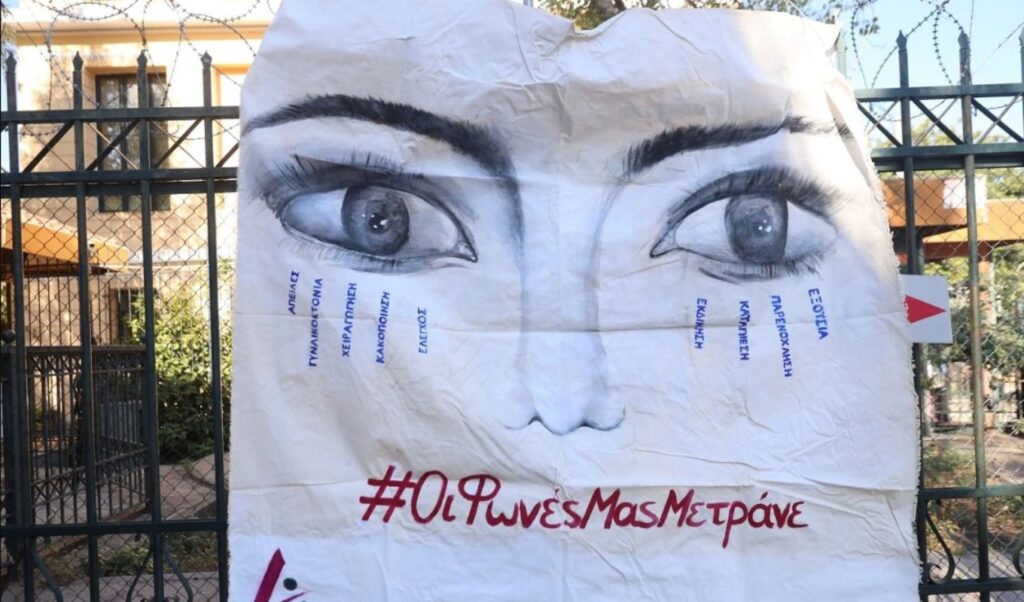The prosecutor of the Athens Mixed Jury Court, Vasiliki Dimopoulou, recommended the conviction of the 40-year-old defendant for the murder of Kyriaki Griva, in a devastating closing argument that exposed the methodical nature of the crime and rejected claims of diminished responsibility. Specifically, the prosecutor sought conviction for premeditated homicide, illegal weapons possession, and weapons use.
“The defendant struck her with fury, with five stab wounds, in an attack lasting eight seconds,” the prosecutor said, describing frame-by-frame the bloody assault that occurred while the 28-year-old was speaking to the Emergency Response unit asking for help. “His act was methodical, organized and calculated. Not the result of mental disorder, but of clear intent.”
“Premeditated homicide”
The prosecutor sought conviction for premeditated homicide in a calm mental state, as well as for illegal weapons possession and use, while recommending acquittal on the charge of drug possession for personal use. The prosecutor’s closing argument shocked the courtroom. Kyriaki’s mother wept almost throughout its duration, while Ms. Dimopoulou concluded with the mother’s own words: “Kyriaki gave him her love and he repaid her with five stab wounds.”
According to the prosecutor, this was a crime of passion triggered by the 28-year-old’s decision to leave the violent and abusive relationship. “He was pathologically jealous of her. He had developed feelings of revenge. He couldn’t bear that she was happy without him,” Ms. Dimopoulou stated.
She analyzed the defendant’s long pattern of abusive behavior against Kyriaki: surveillance, phone monitoring, beatings, jealousy. Testimonies from people in Kyriaki’s circle confirmed, she said, that the defendant had isolated her, hit her, threatened her, while she tried to help him, even while pregnant. “Kyriaki had the illusion that she could change him. This illusion stemmed from her kindness,” the prosecutor said.
“Result of planning”
The prosecutor portrayed the culmination of the criminal act as the result of planning. “He acted with absolute composure and purpose. He was tracking her, knew where she was. He used codes from her phone to activate GPS. He appeared when she was returning home and under the pretext of ‘safety’ accompanied her to the police station. The next day he killed her, with a knife he had taken from his home.”
According to the prosecutor, the defendant attacked from behind, initially struck her in the back, turned her around and stabbed her again. The attack took place just meters from the police station guard. “He knew what he was doing, had awareness and self-control, targeted vital areas,” Ms. Dimopoulou said.
Referring to claims of bipolar disorder, the prosecutor emphasized that “no psychiatric condition is proven that would remove or reduce his culpability.” Instead, she argued that any hospitalizations were related to drug use and not mental illness. She cited the expert opinion appointed by the investigating judge and the technical advisor of Kyriaki’s father, who concluded that the defendant did not suffer from psychotic disorder and had full awareness of reality at the time of the act.
The handwritten letter
She made special reference to Kyriaki’s handwritten letter, through which, according to the prosecutor, the 40-year-old’s manipulative behavior emerges. She also spoke about the tragic irony of the case: “She was lost in his embrace,” Kyriaki’s aunt had said. “The word ‘lost’ is the last word Kyriaki whispers as she dies,” Ms. Dimopoulou noted.
Rejecting the defendant’s claim that he went to Kyriaki’s house to commit suicide, the prosecutor said the neck wound was superficial, intended to create an alibi or evoke pity. “If he wanted to die, he would have succeeded. Just as he succeeded in killing Kyriaki,” she emphasized. In the same context, she commented on the medication found in his possession (Stedon, Xanax), saying it did not indicate therapeutic treatment for mental illness, but substance abuse.
“No evidence proved serious mental illness. The defendant acted with full consciousness, stalked the victim, planned the attack and executed it with precision,” the prosecutor concluded, seeking conviction for premeditated homicide in a calm mental state.




